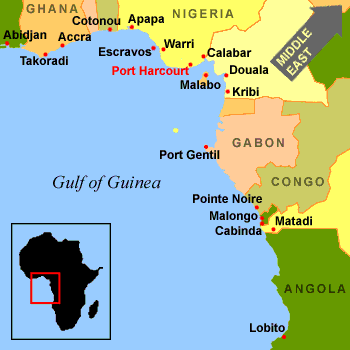
The Weather Channel
Port Harcourt
Exchange rates - converter

| ||
| Location: | Western Africa, in Nigeria | |
| Time: | ||
| Climate: | varies; equatorial in south, tropical in center, arid in north | |
| Weather: | Port Harcourt NI
Weather The Weather Channel Port Harcourt |
|
| Population: | 242,000 (1993) | |
| Currency: | 1 naira (N) = 100 kobo Exchange rates - converter |
|
| Port Harcourt, capital of Rivers state and port town in southern Nigeria. It lies along the Bonny River (an eastern distributary of the Niger), 41 miles (66 km) upstream from the Gulf of Guinea. Founded in 1912 in an area traditionally inhabited by the Ijaw people, it serve as a port, named for Lewis Harcourt - the colonial secretary. Port Harcourt has long been an important merchant port and is today the centre of Nigeria’s oil industry. Its exports include petroleum, coal, tin, palm products, cocoa, and groundnuts. Among the industries of the area are timber processing, car manufacturing, food and tobacco processing, and the manufacture of rubber, glass, metal, and paper products, cement, petroleum products, paint, enamelware, bicycles, furniture, and soap. |
 |
NIGERIA |
|
|
|
|
|
|
|
| People | |
|---|---|
| Population: | 103,912,489 (July 1996 est.) |
| Population growth rate: | 3.05% (1996 est.) |
| Birth rate: | 42.89 births/1,000 population (1996 est.) |
| Death rate: | 12.71 deaths/1,000 population (1996 est.) |
| Sex ratio: | at birth: 1.03 male(s)/female
under 15 years: 1.01 male(s)/female 15-64 years: 1.04 male(s)/female 65 years and over: 1.02 male(s)/female all ages: 1.03 male(s)/female (1996 est.) |
| Infant mortality rate: | 72.4 deaths/1,000 live births (1996 est.) |
| Total fertility rate: | 6.24 children born/woman (1996 est.) |
| Languages: | English (official), Hausa, Yoruba, Ibo, Fulani |
| Literacy: | age 15 and over can read and write (1995 est.)
total population: 57.1% male: 67.3% female: 47.3% |
| Religions: | Muslim 50%, Christian 40%, indigenous beliefs 10% |
| Nationality: | noun: Nigerian(s)
adjective: Nigerian |
| Economy | |
|---|---|
| GDP: | purchasing power parity - $135.9 billion (1995 est.) |
| GDP - real growth rate: | 2.6% (1995 est.) |
| GDP - per capita: | $1,300 (1995 est.) |
| GDP - composition by sector: | agriculture: 38%
industry: 22% services: 40% (1994 est.) |
| Inflation rate - consumer price index: | 57% (1994 est.) |
| Labor force: |
42.844 million
by occupation: agriculture 54%, industry, commerce, and services 19%, government 15% |
| Unemployment rate: | 28% (1992 est.) |
| Budget: | revenues: $2.7 billion
expenditures: $6.4 billion, including capital expenditures of $1.8 billion (1994 est.) |
| Industries: | crude oil, coal, tin, columbite, palm oil, peanuts, cotton, rubber, wood, hides and skins, textiles, cement and other construction materials, food products, footwear, chemicals, fertilizer, printing, ceramics, steel |
| Industrial production growth rate: | NA% |
| Agriculture - products: | cocoa, peanuts, palm oil, rubber, corn, rice, sorghum, millet, cassava (tapioca), yams; cattle, sheep, goats, pigs; fishing and forest resources extensively exploited |
| Exports: | $9.9 billion (f.o.b., 1993)
commodities: oil 98%, cocoa, rubber partners: US 52%, EC 34% |
| Imports: | $7.5 billion (c.i.f., 1993)
commodities: machinery, transportation equipment, manufactured goods, chemicals, food and animals partners: EC 50%, US 13%, Japan 7% |
| Debt - external: | $32.5 billion (1993) |
| Energy Information: | Country Analysis Briefs - Nigeria |
| Transportation | |
|---|---|
| Railways: | total: 3,557 km (1995) |
| Highways: | total: 112,140 km |
| Waterways: | 8,575 km consisting of the Niger and Benue rivers and smaller rivers and creeks |
| Pipelines: | crude oil 2,042 km; petroleum products 3,000 km; natural gas 500 km |
| Merchant marine: | total: 33 ships (1,000 GRT or over) totaling 387,552 GRT/636,578
DWT
ships by type: bulk 1, cargo 16, chemical tanker 3, oil tanker 12, roll-on/roll-off cargo 1 (1995 est.) |
| Ports and harbors: | Calabar, Lagos, Onne, Port Harcourt, Sapele, Warri |
| Transnational Issues | |
|---|---|
| Illicit drugs: | passenger and cargo air hub for West Africa; facilitates movement of heroin en route from Southeast and Southwest Asia to Western Europe and North America; increasingly a transit route for cocaine from South America intended for West European, East Asian, and North American markets |
| Business Daily | GMFoods | NetCafes | SportsNews | WorldNews |

© 1999 Port Harcourt.com |